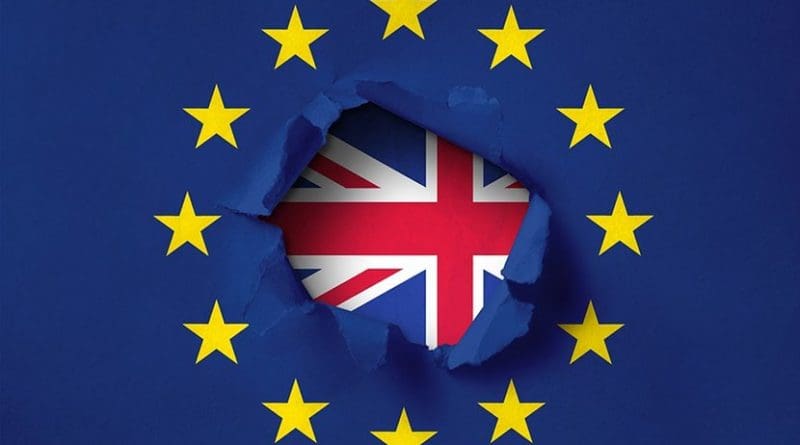Brexit Is Fracturing Europe – Analysis
As UK Prime Minister Theresa May moves forward with Brexit, there are painful reminders of what is to come with Britain’s break from the EU in terms of European unity. This idea of union may be nearing the ash heap of history.
European leadership is weak and splintered. May still faces a battle, and US President Donald Trump’s support for the 2016 referendum and ties to pro-Brexit British politicians who are critical of May enable the White House to put pressure on London during this difficult transition if and when necessary, especially regarding the signing of the new US-UK trade agreement in March 2019. The full impact of Brexit is not yet understood.
Besides May, French President Emmanuel Macron and German Chancellor Angel Merkel are in trouble too. While Macron is facing a challenge from the yellow vest protests, Merkel is choosing to step down from her party’s leadership, which will impact Germany’s outlook on security across the continent. How a changing France and Germany see their divorced partner Britain in the coming years will be a critical test of any trans-Channel relations.
May, Macron and Merkel are politically weakened. This has left Britain, France and Germany even less capable of dealing with their diplomatic and trade disputes with the US, where the Trump White House has been cheering for Brexit and accusing Macron and Merkel of making key foreign policy mistakes.
Trump claims that both leaders created the conditions for higher crime rates and the threat of terrorism via their immigration policies. His comments feed anti-government sentiment, especially among populists and marginalized youth.
Brexit is creating a dynamic that is leading to skepticism about whether a united Europe still exists. Fragmentation is leading to evolving regional views that are at odds with one another. Trump is courting Hungary and Poland, which are populist in outlook.
Merkel’s announcement is a loss for the EU, which she championed from her earliest days in office. But European liberalism is even more at a loss with Macron, who is perhaps increasingly giving up his mantle of protecting progressive values, even though his ideas for the EU and the euro zone have very little energy to them besides rhetorical value.
The EU’s accelerating fragmentation as a political and economic organization will lead to demonstrations and manifestations of violence as norms shift. What is common in Sweden in terms of gang violence and acts of criminality may become more prominent in other European countries.
The yellow vest movement is a lower income-based phenomenon that is able to migrate to other European populations who face their own discontent. The idea of a European culture may well be on life support. What the EU may try to implement in a member country may now meet local resistance and an increasing desire to break away from political unions into smaller, sovereign entities.
A wide range of defense and security issues are subject to change following Brexit. Areas for negotiation include the impact on defense spending, industry and research; UK membership of EU bodies and mechanisms; the UK’s and Europe’s future defense capabilities, ambitions and global strategic roles; and knock-on domestic effects on Scottish independence and the Northern Irish peace process.
These issues have provoked deep uncertainty and speculation at a time when the UK and Europe are being challenged by the defense and security landscape. This includes threats from Russia, terrorism, the migrant crisis, conflicts in the Middle East, and the disruptive effects of new technologies and actors in cyberspace. A divorce during a multi-front fight is not going to be smooth or beneficial for European unity.
Overall, the UK is seen as a net contributor to Europe, but at this time Brexit is looking increasingly sharp with unknown consequences. The result could be that London will use any business or defense leverage as a bargaining chip in the divorce talks. However, this approach may alienate European partners and damage all parties. Conversely, the EU could punish Britain by pushing London away. Once again, Putin laughs last.


Populism was rising in the EU prior to Brexit. In Germany the new AfD populist party was formed in 2013 whereas the referendum was in 2016. Populism has been rising thoughout Europe. In the UK UKIP won enough votes to be the third biggest party under PR in the 2015 election. FPTP means there can only be two parties of significance so UKIP had one seat under FPTP.
A Harvard report on Trump and Brexit found that the major cause was a cultural backlash. Polls in many EU countries now show immigration is the top issue closely followed by terrorism.
Brexit will have had some effect but the rise in importance placed on cultural identity and country values by the public is widespread in Europe and still gaining ground.